新概念英语第二册第59课 In or out 进来还是出去
新概念英语第二册逐句精讲语言点第59课
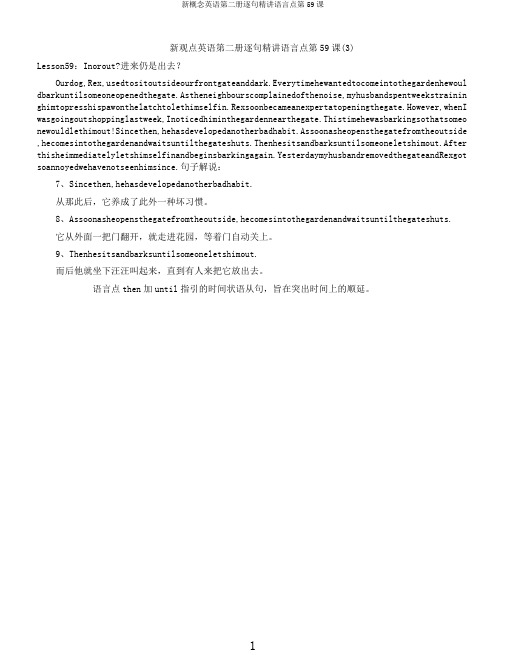
新观点英语第二册逐句精讲语言点第59课(3)Lesson59:Inorout?进来仍是出去?Ourdog,Rex,usedtositoutsideourfrontgateanddark.Everytimehewantedtocomeintothegardenhewoul dbarkuntilsomeoneopenedthegate.Astheneighbourscomplainedofthenoise,myhusbandspentweekstrainin ghimtopresshispawonthelatchtolethimselfin.Rexsoonbecameanexpertatopeningthegate.However,whenI wasgoingoutshoppinglastweek,Inoticedhiminthegardennearthegate.Thistimehewasbarkingsothatsomeo newouldlethimout!Sincethen,hehasdevelopedanotherbadhabit.Assoonasheopensthegatefromtheoutside ,hecomesintothegardenandwaitsuntilthegateshuts.Thenhesitsandbarksuntilsomeoneletshimout.After thisheimmediatelyletshimselfinandbeginsbarkingagain.YesterdaymyhusbandremovedthegateandRexgot soannoyedwehavenotseenhimsince.句子解说:7、Sincethen,hehasdevelopedanotherbadhabit.从那此后,它养成了此外一种坏习惯。
8、Assoonasheopensthegatefromtheoutside,hecomesintothegardenandwaitsuntilthegateshuts.它从外面一把门翻开,就走进花园,等着门自动关上。
新概念英语第二册第59课-In or out
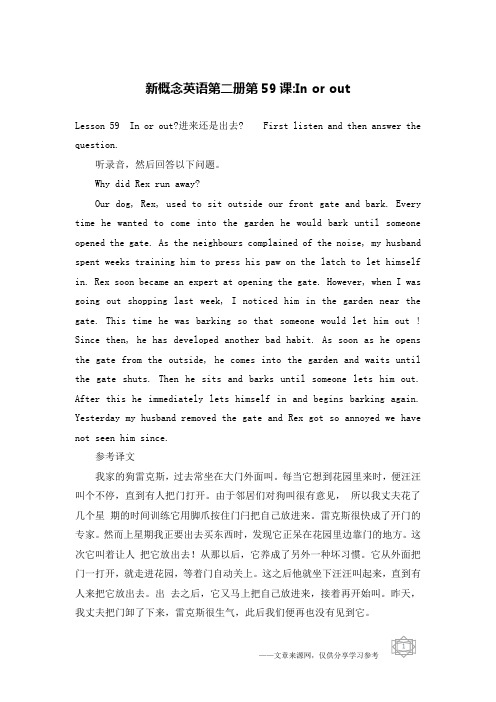
新概念英语第二册第59课:In or outLesson 59 In or out?进来还是出去? First listen and then answer the question.听录音,然后回答以下问题。
Why did Rex run away?Our dog, Rex, used to sit outside our front gate and bark. Every time he wanted to come into the garden he would bark until someone opened the gate. As the neighbours complained of the noise, my husband spent weeks training him to press his paw on the latch to let himself in. Rex soon became an expert at opening the gate. However, when I was going out shopping last week, I noticed him in the garden near the gate. This time he was barking so that someone would let him out ! Since then, he has developed another bad habit. As soon as he opens the gate from the outside, he comes into the garden and waits until the gate shuts. Then he sits and barks until someone lets him out. After this he immediately lets himself in and begins barking again. Yesterday my husband removed the gate and Rex got so annoyed we have not seen him since.参考译文我家的狗雷克斯,过去常坐在大门外面叫。
新概念二Lesson 59 知识点整理

Lesson 59 In or out 进来还是出去?学习目标全解必记单词bark v. 狗叫press v. 按压paw n. 脚爪latch n. 门闩expert n. 专家develop v. 养成habit n. 习惯remove v. 拆掉,取下常考短语used to do sth. 过去常常做某事every time 每当complain of…抱怨…spend time (in) doing sth./on sth. 花费时间去做某事train sb. to do sth. 训练某人做某事let sb. in/out 让某人进来/出去develop a bad habit 养成一个坏习惯become an expert at…成了…的能手get annoyed 生气经典句型1.Our dog, Rex, used to sit outside our front gate and bark.2.Every time he wanted to come into the garden he wouldbark until someone opened the gate.3.As the neighbours complained of the noise, my husbandspent weeks training him to press his paw on the latch tolet himself in.4.Rex soon became an expert at opening the gate.5.However, when I was going out shopping last week, Inoticed him in the garden near the gate.6.Since then, he has developed another habit.7.As soon as he opens the gate from the outside, he comesinto the garden and waits until the gate shuts.8.Yesterday my husband removed the gate and Rex got soannoyed we have not seen him since.重点语法表示目的的几种方式:to, in order to, so as to, so that, inorder that的区分(1)在bring, buy, need, take, use, want等动词后常用宾语+to而不用宾语+in order to/so as toeg.I want something to drink.我想要一点喝的东西。
新概念英语第二册课堂笔记:第59课

新概念英语第二册课堂笔记:第59课lesson 59bark v 狗叫press v 按,压paw n 脚爪latch n 门闩expert n 专家develop v 养成habit n 习惯remove v 拆掉,取下the dog is barkingsomebody is barking某人在咆哮cat's paw被人所利用的人i don't want to be a cat's paw我才不想被人利用bar门闩expert at/in在某一方面是专家expert at/in doing sthdevelop the file冲洗胶卷develop:发展developing skills:发展技巧developing country:发展中国家developed country发达国家bliling water滚开水boiled water开水custom:风俗,习俗customs海关customer顾客remove sth from从...挪走textOur dog, Rex, used to sit outside our front gate and bark. Every time he wanted to come into the garden he would bark until someone opened the gate. As the neighbours complained of the noise, my husband spent weeks training him topress his paw on the latch to let himself in. Rex soon became an expert at opening the gate. However, when I was going out shopping last week, I noticed him in the garden near the gate. This time he was barking so that someone would let himout ! Since then, he has developed anotherbad habit. As soon as he opens the gatefrom the outside, he comes into the gar-den and waits until the gate shuts. Thenhe sits and barks until someone lets him out. After this he immediately lets himselfin and begins barking again. Yesterday my husband removed the gate and Rexgot so annoyed we have not seen him since.let sb in让某人进来let sb out让某人出去let sb down让某人失望let‘s like let's go and so onfront gatewould=used toevery time=whenthe monment=as soon asthe monment一...就...(强调的是瞬间every time:每次,每当every time i turn to lesson 59,i will remember my teachercomplaim of抱怨。
新概念英语第二册 lesson 59讲解
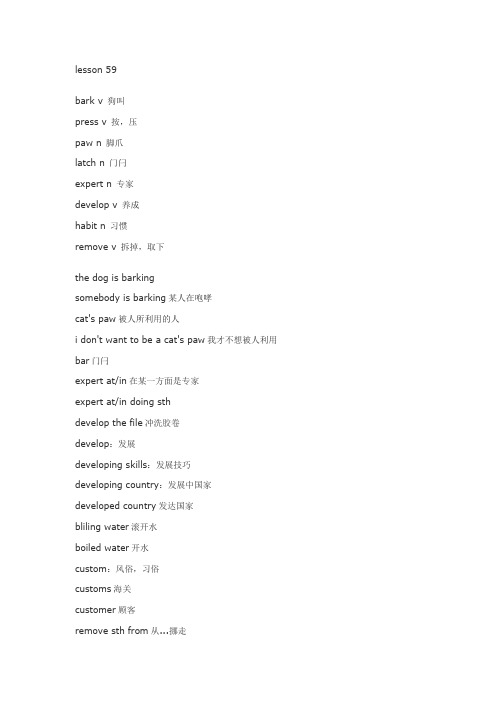
lesson 59bark v 狗叫press v 按,压paw n 脚爪latch n 门闩expert n 专家develop v 养成habit n 习惯remove v 拆掉,取下the dog is barkingsomebody is barking某人在咆哮cat's paw被人所利用的人i don't want to be a cat's paw我才不想被人利用bar门闩expert at/in在某一方面是专家expert at/in doing sthdevelop the file冲洗胶卷develop:发展developing skills:发展技巧developing country:发展中国家developed country发达国家bliling water滚开水boiled water开水custom:风俗,习俗customs海关customer顾客remove sth from从...挪走textOur dog, Rex, used to sit outside ourfront gate and bark. Every time he wantedto come into the garden he would barkuntil someone opened the gate. As theneighbours complained of the noise, myhusband spent weeks training him topress his paw on the latch to let himselfin. Rex soon became an expert at openingthe gate. However, when I was going outshopping last week, I noticed him in thegarden near the gate. This time he wasbarking so that someone would let himout ! Since then, he has developed anotherbad habit. As soon as he opens the gatefrom the outside, he comes into the gar-den and waits until the gate shuts. Thenhe sits and barks until someone lets him out. After this he immediately lets himselfin and begins barking again. Yesterday my husband removed the gate and Rex got so annoyed we have not seen him since.let sb in让某人进来let sb out让某人出去let sb down让某人失望let‘s like let's go and so onfront gatewould=used toevery time=whenthe monment=as soon asthe monment一...就...(强调的是瞬间every time:每次,每当every time i turn to lesson 59,i will remember my teacher complaim of抱怨spend time doing花费某段时间去做某事it takes sb事情做主语sb spend time人做主语train sb to do 训练某人做某事press his paw/press the latchpress the button/press the figure on the buttonso that:以便于,为了(表达目的)so...that...如此...以至于,结果状语从句,可以省略一个词表达目的:to/in order to/in order that/ so as to/so that,to+动词原形,他哈特+从句目的状语从句必须具备一个特征,在动词前面一定要出现情态动词目的状语从句当中不存在want,只有to do非谓语动词的否定形式在结构前面如果发现do的动作不是由主语做的,而是由其他人做的,在to的前面加for sb 不定式的逻辑主语for sb to do sthmultiple choice6、so that引导目的状语从句in case 以防万一,如果EG.:Bring your unbrella in case it rainsso表示结构:引导句子7、as soon as he______...as soon as引导状语从句状语从句中使用一般现在时取代一般将来时be opening强调动作正在发生has been doing现在完成进行时强调从过去延续到现在。
新概念第二册 59课 In or out
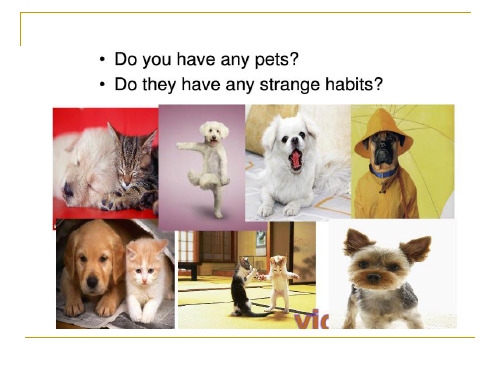
This time he was barking so that someone would let him out! Since then, he has developed another bad habit.
As soon as he opens the gate from the outside, he comes into the garden and waits until the gate shuts.
into—until—gate shuts 8. sits and barks—until—let him out 9. removed—gate—annoyed—haven’t seen
1. Dog,Rex—front gate—bark 2. Every time he wanted—until someone
3. neighbours complained—my husband—
training him—latch—let himself in 4. last week—noticed—near the gate 5. This time—barking—let him out 6. Since then—another bad habit 7. As soon as—opens—the outside—comes
As the neighbours complained of the noise, my husband spent weeks training him to press his paw on the latch to let himself in.
Complain of/about… train sb. to do sth. 训练某人做某事 let sb. in let sb. out let sb. down 让某人失望
(推荐)新概念英语第二册Lesson59

Important phrases
过去常常
used to
每当,每次
every time
抱怨,发牢骚
complain of
让...进来/出去
let...in /out
开门的专家
an expert at opening the gate
养成了另外一种坏习惯 developed another bad habit
• Expert常与介词at,in,on,with连用
• John is an expert at driving a car. • 约翰是开车高手。
• She is an expert in flowers. • 她是花卉方面的专家。
• Sam is an expert on that problem. • 萨姆是研究那个问题的权威。
when you leave.
★expert n. 专家 • expert at/in sth. 在某一方面是专家 • expert at/in doing sth. • He is an expert in maths.
• become an expert at doing sth. 成了……能 手/专家/权威
expert adj.熟练地,老练的,擅长的
• an expert economist 一个老练的经济学家
• an expert thief 一个熟练的贼
be expert at sth/ doing sth
be expert in sth/ doing sth
• 她对付孩子非常擅长。
擅长….
• She is expert at handling children.
New words and expressions
新概念第二册第59课时
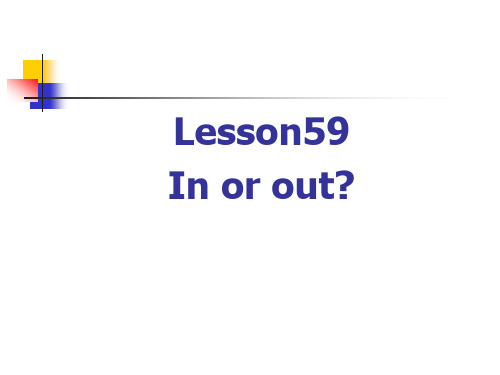
紧迫
Key words & expressions
★paw n. 脚爪 The cat’s paw was burnt. cat's paw 被利用的人 I don‘t want to be a cat’s paw.
我才不想被人利用 。
★ expert n. 专家,能手 adj. 熟练的,老练的
★ an expert in/ at (doing) sth (某方 面的)专家/ 能手
★ be/ become expert in/at (doi译】:
1)他是个老练的司机。 He is an expert in/at driving a car. = He is expert in/ at driving a car. 2)They are all experts in this field. 他们都是这个领域的行家。
Key words & expressions
★develop v. 养成 develop a habit ① vt. &vi. 发展,扩展 The village has developed into a town
now. developing country 发展中国家 ; developed country 发达国家 boiling water 滚开水 ; boiled water
开水
trained animals 驯化了的动物 abandoned farms 废弃了的农场 落叶_fa_l_le_n_l_e_a_v_e_s_____ 正在飘落的树叶f_a_lli_n_g_l_e_a_v_e_s__
Key words & expressions
新概念英语第二册59课课文
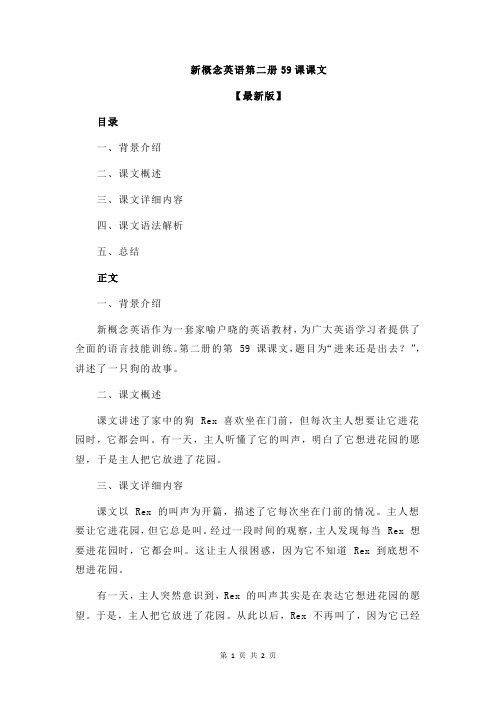
新概念英语第二册59课课文
【最新版】
目录
一、背景介绍
二、课文概述
三、课文详细内容
四、课文语法解析
五、总结
正文
一、背景介绍
新概念英语作为一套家喻户晓的英语教材,为广大英语学习者提供了全面的语言技能训练。
第二册的第 59 课课文,题目为“进来还是出去?”,讲述了一只狗的故事。
二、课文概述
课文讲述了家中的狗 Rex 喜欢坐在门前,但每次主人想要让它进花园时,它都会叫。
有一天,主人听懂了它的叫声,明白了它想进花园的愿望,于是主人把它放进了花园。
三、课文详细内容
课文以 Rex 的叫声为开篇,描述了它每次坐在门前的情况。
主人想要让它进花园,但它总是叫。
经过一段时间的观察,主人发现每当 Rex 想要进花园时,它都会叫。
这让主人很困惑,因为它不知道 Rex 到底想不想进花园。
有一天,主人突然意识到,Rex 的叫声其实是在表达它想进花园的愿望。
于是,主人把它放进了花园。
从此以后,Rex 不再叫了,因为它已经
得到了自己想要的。
四、课文语法解析
本课的语法重点是情态动词的用法。
课文中用到了“would”这个情态动词,表示过去常常发生的动作或存在的状态。
“would”也可以表示一种倾向、习惯或特点。
例如,课文中的句子“every time he wanted to come into the garden, he would bark”(每次它想进花园时,它都会叫),表示 Rex 过去常常在想进花园时叫。
五、总结
通过这个故事,我们学会了要细心观察,了解别人的需求。
新概念英语第二册:Lesson59课文注释

【导语】新概念系列教材的经典早已不⾔⽽喻。
其⽂章的短⼩精悍,语句的幽默诙谐,语法的全⾯⽽系统,历来被公认为是适合⼤多数中学朋友课外学习的资料之⼀。
⽆忧考为您整理了以下内容,仅供参考。
希望可以帮助到您!如果您想要了解更多相关内容,欢迎关注⽆忧考! 【篇⼀】 Every time he wanted to come into the garden he would bark until someone opened the gate.每当它想到花园⾥来时,便汪汪叫个不停,直到有⼈把门打开。
every time在这⾥为连词引导⼀个时间状语从句,表⽰“每次”、“每当”,主句中的would表⽰过去的习惯性动作。
⽤⼀般过去时的句⼦中它们经常连⽤: Every time we met, we would talk for a while. 我们每次见⾯都要聊⼀会⼉。
Every time he came to the restaurant, he would first ask for a cup of tea. 他每次到这个饭馆来,都是先要⼀杯茶。
【篇⼆】 …my husband spent weeks training him to press his paw on the latch to let himself in.……我丈夫花了⼏个星期的时间训练它⽤脚⽖按住门闩把⾃⼰放进来。
(1)spend表⽰“在……上花时间”时,后⾯如果跟名词则⽤介词on;如果跟动名词则⽤介词in(在⼝语中in往往省略): Why don't you spend more time on studies? 你为什么不在学习上再多花点时间呢? I spent two weeks(in) reading this book. 我花了两星期的时间读这本书。
(2)train的宾语是him, to press…是宾语补⾜语,to let…为⽬的状语。
新概念二册问答及摘要写作59-72课
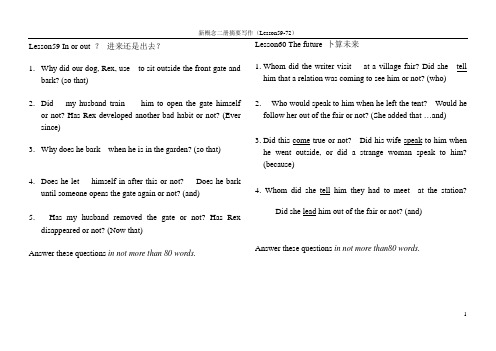
Lesson59 In or out ?进来还是出去?1.Why did our dog, Rex, use to sit outside the front gate andbark? (so that)2.Did my husband train him to open the gate himselfor not? Has Rex developed another bad habit or not? (Ever since)3.Why does he bark when he is in the garden? (so that)4.Does he let himself in after this or not? Does he barkuntil someone opens the gate again or not? (and)5.Has my husband removed the gate or not? Has Rexdisappeared or not? (Now that)Answer these questions in not more than 80 words.Lesson60 The future 卜算未来1. Whom did the writer visit at a village fair? Did she tell him that a relation was coming to see him or not? (who)2. Who would speak to him when he left the tent? Would he follow her out of the fair or not? (She added that …and)3. Did this come true or not? Did his wife speak to him when he went outside, or did a strange woman speak to him? (because)4. Whom did she tell him they had to meet at the station?Did she lead him out of the fair or not? (and)Answer these questions in not more than80 words.1Lesson61 Trouble with the Hubble 哈勃望远镜的困境1. When was the Hubble telescope launched into space? What were the pictures it sent us like? Why?(When the Hubble… , the pictures…, because…)2. What will the four astronauts from the shuttle Endeavour be doing? What will the pictures from the Hubble tell us? (and eventually)Answer these questions in not more than 60 words.Lesson62 After the fire 大火之后1. How long did it take the firemen to get the forest fire under control?2. Had all the great trees been burnt or not? Was there danger that heavy rain would cause serious floods or not? Would the floods destroy the surrounding villages or not?(Now that…which)3. Did the forest authorities order grass-seed to prevent this or not? For how long was it sprayed over the ground by planes? (To prevent this…which…)4. Did it begin to rain or not? Where had the grass taken root ? (By the time that…)Answer these questions in not more than 75 words.2Lesson63 She was not amused 她并不觉得好笑1. Is Jeremy Hampden greatly admired for his great sense of humour or not? What was he invited to do? Did he immediately agree to do so or not?(When Jeremy…who is…)2. Did the speech contain a lot of funny stories or not? Was it a great success or not? (Since)3. What did his six-year-old daughter, Jenny, want to do after his speech? Was Jeremy disappointed or not? (When)4. Why had she not enjoyed it? (because)Answer these questions in not more than 80 words.Lesson64 The Channel Tunnel 英吉利海峡隧道1. Who planned to build a tunnel under the English Channel in 1858? How would it be ventilated? (The tunnel, which…)2. Who suggested a better plan two years later?3. How would passing trains solve the problem of ventilation in his proposed double railway-tunnel? (because they would)4. Did work begin forty-two years later or not? Why was it stopped? (Though…because)5.When was the Channel Tunnel officially opened? (However) Answer these questions in not more than 85 words.3Lesson65 Jumbo versus the police 小象对警察1.What did he decide to take to a children’s hospital? How did the circus owner, Jimmy Gates, dress up ? Did he set off down the main street of the city, or did he go down a side street? Was he riding an elephant called Jumbo or not? (After having…and … riding)2. Was he told that he was holding up the traffic or not? Did Jimmy agree to go at once or not? Did Jumbo agree to go, or did he refuse to move? How many policemen had to push him off the main street? (On being…but…so…)3. Did he have a good record or not? Was Jumbo arrested or not? (As…however…)Answer these questions in not more than 80 words.Lesson66 Sweet as honey! 像蜜一样甜!1.Was the Lancaster bomber badly damaged when it crashed ona remote island in the south Pacific?2. How long did the wreck remain undisturbed ? How was it rediscovered? (Then…until…)3. What did the French authorities do with the plane? Who will be having it restored? (…, where…)4. How many engines will they have to have rebuilt? Why is the fourth engine still in perfect condition?(…, but …because…)Answer these questions in not more than 100 words.4Lesson 67 V olcanoes火山1. Where did Tazieff, the Polish scientist, go in 1948? Why did he go there? What did he call it? (to… which)2. Did he take photographs or not? Did he have to leave almost at once or not? Did a river of liquid rock threaten to surround him or not? (After taking…because)3.Did he escape just in time or not? When did he return ?Had the volcano become quiet, or was it still active? (but…when)4. Where did he climb this time? Why did he do so? (in order to)Answer these questions in not more than 80 words.Lesson 68 Persistent纠缠不休1. Did Elizabeth try to avoid meeting Nigel Dykes or not? Was she able to do so or not? (Even though)2. Did he always insist on accompanying her or not? Whatdid she have to do? (As)3. Where did she tell him she was going? Why did he say hewould come with her? (When … because)Answer these questions in not more than 70 words.5Lesson 69 But not murder! 并非谋杀!1.Had Mr. Eames driven successfully in heavy traffic duringhis third driving test or not? What did the examiner instruct him to do? (when)2.What did he tell him to suppose? (that…would)3.What would Mr. Eames have to do when the examinertapped on the window?4.Did he tap loudly or not? Did Mr. Eames reactquickly enough or not? What was he told?( Though…and) Answer these questions in not more than 80 words.Lesson 70 Red for danger危险的红色1. Did a drunk suddenly wander into the middle of the ring during a bullfight or not? What did he do? (and)2. Did the bull ignore the matador or not? What did it do? Why did he step aside? (Ignoring…but)3. Did the crowd cheer or not? What did the drunk do? (and)4. Did three men drag the drunk to safety just after this ornot? Did the bull look on sympathetically or not?Did it once more turn its attention to the matador or not?(Just after this…while…before it…)Answer these questions in not more than75 words.6Lesson 71 A famous clock一个著名的大钟1.When were the Houses of Parliament burnt down ? Whowas made responsible for the construction of a huge clock?Did it become known as Big Ben or not? (After…which…)2.Why is it very accurate despite its immense size? (for)3.Has this clock often gone wrong, or has it rarely gonewrong? Why can it be heard on the B.B.C. when it is striking? (This clock which…because…)Answer these questions in not more than 75 words.Lesson 72 A car called bluebird“蓝鸟”汽车1. Who set up a land-speed record in 1935? What was his car called? Had it been specially built for him or not? (driving a car…which)2. Was his average speed incorrectly declared to be 299 miles per hour or 289 miles per hour? Was this mistake corrected later or not? (but)3. How many miles an hour had he averaged?4. Is Sir Malcolm’s son, Donald, one of the racing drivers who have exceeded the old record? What was his car called? (Among them is…whose)Answer these questions in not more than75 word7。
新概念英语第二册第59课-In or out
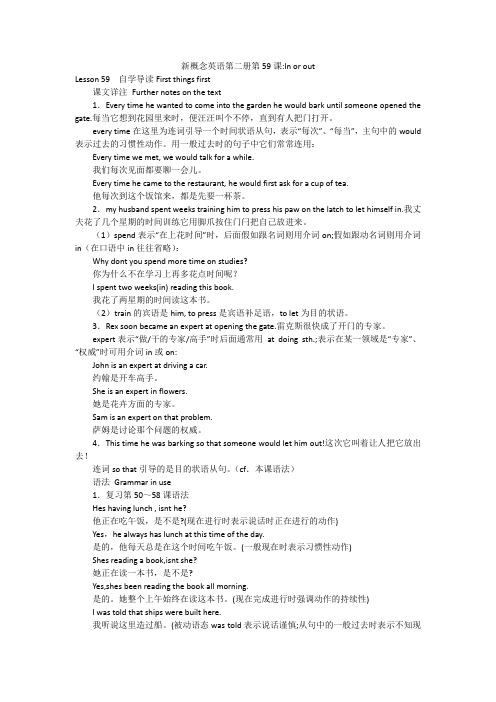
新概念英语第二册第59课:In or outLesson 59 自学导读First things first课文详注Further notes on the text1.Every time he wanted to come into the garden he would bark until someone opened the gate.每当它想到花园里来时,便汪汪叫个不停,直到有人把门打开。
every time在这里为连词引导一个时间状语从句,表示“每次”、“每当”,主句中的would 表示过去的习惯性动作。
用一般过去时的句子中它们常常连用:Every time we met, we would talk for a while.我们每次见面都要聊一会儿。
Every time he came to the restaurant, he would first ask for a cup of tea.他每次到这个饭馆来,都是先要一杯茶。
2.my husband spent weeks training him to press his paw on the latch to let himself in.我丈夫花了几个星期的时间训练它用脚爪按住门闩把自己放进来。
(1)spend表示“在上花时间”时,后面假如跟名词则用介词on;假如跟动名词则用介词in(在口语中in往往省略):Why dont you spend more time on studies?你为什么不在学习上再多花点时间呢?I spent two weeks(in) reading this book.我花了两星期的时间读这本书。
(2)train的宾语是him, to press是宾语补足语,to let为目的状语。
3.Rex soon became an expert at opening the gate.雷克斯很快成了开门的专家。
新概念英语第二册第59课 In or out 进来还是出去
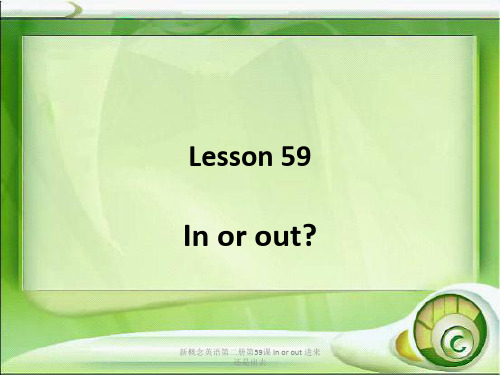
新概念英语第二册第59课 In or out 进来 还是出去
9
Watch the story and answer the following questions.
• (1) What did our dog use to do? • (2) Why did he bark like that? • (3) Why did your husband train him to let him in? • (4) What did you find when you were out for
11
★bark
v 狗叫
• 狗在叫。
• the dog is barking
• 那只狗老是对我叫
• That dog always barks at me.
• somebody is barking
• 某人在咆哮
• A barking dog seldom bites.
• (谚)善吠之犬不咬人
新概念英语第二册第59课 In or out 进来 还是出去
新概念英语第二册第59课 In or out 进来 还是出去
15
• ★expert n. 专家 • expert on/in sth. 在某一方面是专家 • expert at doing sth. • 他是数学专家。 • He is an expert in maths. • 他是开锁专家 • He is an expert at opening the door.
• He walked so fast that he didn't notice his wife.
新概念英语第二册第59课 In or out 进来 还是出去
24
新概念英语二讲义59-60

Lesson59 In or out? Vocabulary1. press v. /n.按,出版pressure n. 压力2. expert n. 专家be an expert in / at / on sth. 在某方面是专家3. develop v. 养成,发展development n.发展4. remove v. 拆掉be removed from 与---远离Texted to do 过去常常be used to do 被用于be used to doing 习惯于2.spend --- spent --- spent 花费spend sb some time / money on sthspend sb some time/ money (in) doing sth3.let sb in 让---进来4.be / become an expert in / at / on 在某方面是专家5.notice(无心)注意到的observe(留心)观察到的6.develop a habit 养成习惯develop another habit 养成另一个习惯7.as soon as 一---就---8.annoy v. 恼怒annoyed a.(感到)恼怒的annoying a. (令人)恼怒的Lesson 60 The future Vocabulary1.future n. 未来in the future 将来in future 今后2.fair n. 集市 a. 公平的3.fortune n. 命运fortunate a. 幸运的fortunately ad. 幸运地4.relation n. 亲属relate to 与---有关联relationship 关系Text1.decide to do 决定做make up one’s mind to domake a decision to do2.give sb sth 给---某物give sth to sb3.tell sb (not) to do 告诉(不)做4. a relation of yours你的一个亲戚(双重所有格)5.intend to do 打算6.get a big surprise 惊喜7.the moment = as soon as 一---就8.less than 不到more than 多于9.walk away 走开10.follow sb . 跟随---。
- 1、下载文档前请自行甄别文档内容的完整性,平台不提供额外的编辑、内容补充、找答案等附加服务。
- 2、"仅部分预览"的文档,不可在线预览部分如存在完整性等问题,可反馈申请退款(可完整预览的文档不适用该条件!)。
- 3、如文档侵犯您的权益,请联系客服反馈,我们会尽快为您处理(人工客服工作时间:9:00-18:30)。
• However, when I was going out shopping last week, I noticed him in the garden near the gate. • Notice: vt. 注意,留心,通知 • As soon as your application is approved, I will personally notice you. • He walked so fast that he didn't notice his wife.
• • • • • • •
很难在这个城市中扩展您的业务 It’s hard to develop your business in this city. developing country 发展中国家 developed country 发达国家 boiling waterp the film 冲洗胶卷 Develop software
• • • • • • •
★expert n. 专家 expert on/in sth. 在某一方面是专家 expert at doing sth. 他是数学专家。 He is an expert in maths. 他是开锁专家 He is an expert at opening the door.
Lesson 59
In or out?
Something about Dogs Do you know these dogs?
Golden retriever
Border Collie
Labrador
Poodle
Pekingese
Husky
Do you know how to pet a dog?
• ★develop • ① vt. &vi.(逐渐)显现出,产生,获得,养 成 • 她对游泳产生了兴趣。 • She developed an interest in swimming. • ②vt. &vi. 发展,扩展 • 这个小村庄现在已经发展成为了一个镇。 • The village has developed into a town now. • 你相信通过看电视能开发你的智力吗? • Do you believe that you can develop your mind through watching TV?
expressions
• • • • • • • 过去常常 抱怨,投诉 让...进来/出去 ...方面的专家 养成习惯 很生气 外出购物
expressions
• • • • • • • • 过去常常 抱怨,投诉 让...进来/出去 ...方面的专家 养成习惯 很生气 外出购物 从那以后
• • • • • • • • Used to Complain of Let...in/out An expert at... Develop a habit Get annoyed Go out shopping Since then
Watch the story and answer the following questions.
• • • • (1) What did our dog use to do? (2) Why did he bark like that? (3) Why did your husband train him to let him in? (4) What did you find when you were out for shopping last week? • (5) Why was he barking this time? • (6) What is his bad habit? • (7) What happened to your dog finally?
• ③ vt. 催促,敦促,竭力劝说 • 我父母劝说我报名参加比赛。 • My parents pressed me to enter for the competition. • 我不喜欢被人催促。 • I don’t like to be pressed. • pressure n. 压, 压力, 电压, 压迫, 强制, 紧迫
单词学习
• • • • • • • • bark press paw latch expert develop habit remove v. 狗叫 v. 按,压 n. 脚爪 n. 门闩 n. 专家 v. 养成 n. 习惯 v. 拆掉,取下
★bark v 狗叫 • 狗在叫。 • the dog is barking • 那只狗老是对我叫 • That dog always barks at me. • somebody is barking • 某人在咆哮 • A barking dog seldom bites. • (谚)善吠之犬不咬人
• • • • • • • •
★paw n. 脚爪 cat's paw 被利用的人 我才不想被人利用 I don't want to be a cat's paw 这只猫的爪子被烧伤了。 The cat’s paw was burnt 我的狗的爪子在流血。 My dog’s paw is bleeding.
★press v. 按, 压 • ① vt.&vi. 按,挤,压 • 你能帮我按一下那个钮吗? • Can you press that button for me please? • ② vt. 挤取,榨取(……的汁) • 如果你喜欢果汁,你可以榨点橙汁。 • If you prefer juice, you can press some oranges.
• • • • • • • Answer the following questions: (1) Which food is better for the dogs? Dry or wet? (2) How much food do you feed your dog every day? Three meals a day or one meal a day? (3) Which disease is more common among dogs? Rabbis or skin diseases?
• Since then, he has developed another bad habit. • Since then:从那以后 • I haven't seen him since then .
Yesterday my husband removed the gate and Rex got so annoyed we have not seen him since. get annoyed: Annoy: v. 使恼怒, 使烦恼, 骚扰 A fly kept annoying me . =I was kept annoyed by a fly.
Text Analysis
• Our dog, Rex, used to sit outside our front gate and bark. • used to do sth. 过去常常 • be used to doing sth. 习惯做某事 • Women used to think they were on the shelf at 30 . • Money is used to enjoying life.
• • • • • • • • •
★habit n 习惯(指个人习惯) Develop a habit 养成……习惯 custom : 风俗, 习俗 customs海关 customer顾客 ★remove v 拆掉, 取下 remove sth from从...挪走 有一会儿他的视线没有从她的面孔上移开 For a moment he did not remove his eyes from her face.
As the neighbors complained of the noise, my husband spent weeks training him to press his paw on the latch to let himself in. Complain of/about:抱怨, 发牢骚, 诉苦 I have nothing to complain of/about . spend: 花费时间,金钱,精力 We spent many hours in a pleasant conversation = We spend many hours talking。
